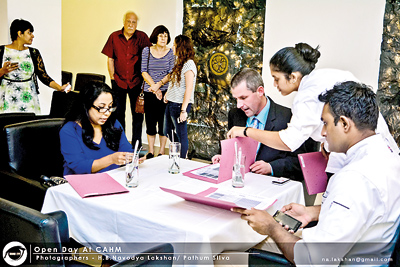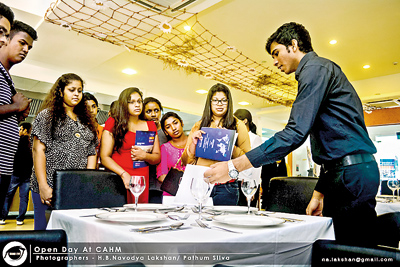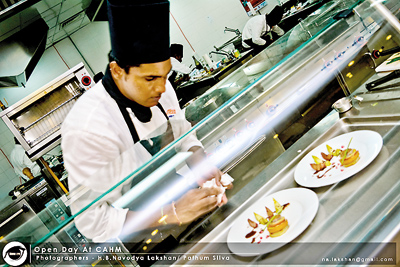Hospitality students impress at CAHM
Hospitality is one of the fastest growing industries in Sri Lanka at present. Yet surprisingly, it remains largely under-promoted as a viable career path for young people.
The Colombo Academy of Hospitality Management (CAHM), a joint venture of William Angliss Institute, Australia and SLIIT, recently hosted executive chef of Unilever Food Solutions, Saman Wijeratne, and deputy general manager of Citrus Waskaduwa, C. Sudusinghe, at their SLIIT campus in Malabe in a guest lecture titled, “Represent team interests in the wider environment”.
The lectures were followed by a delicious local themed luncheon prepared by the students under the direction of chefs Kapila Jayanetti and Samantha Surene.
The entire event from management to service and handmade decorations was organised by the Certificate IV students within a period of two weeks as part of their course.
The Sri Lankan themed restaurant was simple yet stylish. Coconut husks filled with various spices served as each table’s centrepiece and I was served a minty delight upon arrival, unlike any other welcome drink I had ever tasted.
“The course is very hands-on. You get to meet all types of people and it’s full of teamwork,” said student Chaniya Ishini Ranaweera.
The academy provides a two year advanced diploma of hospitality management, covering food, tourism, hospitality and events.
Mr. Wijeratne, on his first visit, was thoroughly impressed by its facilities, especially the large open kitchen. He called the academy’s faculty “brilliant” and said students were lucky to be studying under masters like the renowned chef Kapila.
He spoke about what it takes to make it in the current industry, telling students they needed to “be one step ahead” and “multi-skilled” if they wished to become chefs de cuisine someday.
A point reiterated by Mr. Sudusinghe who emphasised the importance of human capital: knowledge, skill and abilities, to succeed in the industry.
Mr. Wijeratne also spoke about the vast global opportunities that open up with a career in tourism and hospitality. Interestingly, he told students that Unilever prioritises on gender-balance, an exciting prospect for women entering the industry.
However, a quick scan of the room showed an overwhelming majority of male students and the ratio of male to female in the Certificate IV class that organised this event was seventeen to six.
Unlike most of the other students who started here straight after A/Ls or O/Ls, Asuntha Wijesinghe, 30, is married with two kids and spent six years in banking before deciding on a different career. Asuntha dreams of becoming a chef with her own restaurant someday.
“I was uncomfortable at first, being much older than most of the others, but now we all get along and the lecturers are very accommodating of my family commitments,” said Asuntha.
CAHM was the only institute in the country to send a student to the first Young Chef Olympiad held in Kolkata earlier this year. Harsha Alahakoon returned with an award naming CAHM as one of the top ten hospitality institutes of the world.
The academy also has lecturers visiting from Singapore and Australia every six months. “The students are very eager to learn which is refreshing,” said visiting lecturer Deb Combe who is here from Australia for the fourth time.
“Everyone thinks they have to be a doctor, lawyer, or engineer,” said Sajani De Silva, marketing executive, “but you don’t have to follow the flock. You should find something that interests you and that you can be employed in.”


